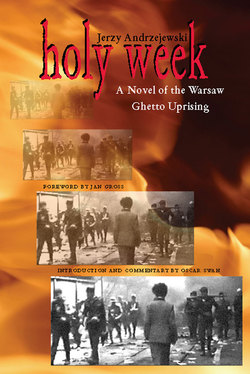Читать книгу Holy Week - Jerzy Andrzejewski - Страница 11
На сайте Литреса книга снята с продажи.
ОглавлениеNote on the Author
JERZY ANDRZEJEWSKI (1909–83), one of modern Poland’s most versatile prose writers and one of the best known outside Poland, was born in Warsaw. He attended the University of Warsaw from 1927 to 1931, where he majored in Polish literature but left without receiving a degree. His first collection of short stories, Unavoidable Roads (Drogi nieukniknione), appeared in 1936, followed by the widely acclaimed novel Mode of the Heart (Ład serca). During the Second World War, he was active in the literary underground. His first postwar novels were Holy Week, published as part of the volume Night (Noc, 1945), and the much better known Ashes and Diamonds (Popiół i diament, 1948), which dealt with the adjustments Poles had to make following their country’s forced entry into the Soviet sphere of influence. These works established Andrzejewski’s reputation as a writer of moral conflict and dilemma in the tradition of the French existentialists.
Before the war, Andrzejewski had been an outspoken opponent of the intrusion of politics into literature. In the early postwar years, however, he increasingly accommodated himself to the political reality of the time, joining the Polish United Workers’ Party (Polska Zjednoczona Partia Robotnicza) in 1950. He soon thereafter published an infamous manifesto in which he subjected his previous work to criticism and pledged allegiance to Marxist doctrine. Throughout the early 1950s, he played the role of publicist and ardent spokesman for the party line.
The year 1954 found Andrzejewski politically sanitizing a new edition of Ashes and Diamonds, which became required reading in the schools. In the same year, however, he published a collection of short stories whose title piece, The Gold Fox (Złoty lis), is a thinly veiled critique of the oppressive effect of socialist reality on imagination, creativity, and interpersonal and family relations. This work became one of the literary landmarks of Poland’s literary and political “thaw” following the death of Stalin and preceded by a number of years the appearance of similar literature in the Soviet Union.
From that point on, Andrzejewski directed his literary and journalistic activities toward the goal of carving out for himself the role of spokesman for progressive currents in Polish cultural life. Darkness Covers the Earth (Ciemności kryją ziemię, 1957), a historical novel set in the time of the Spanish Inquisition, can be read without much imagination as a condemnation of the Stalinist mentality, the Communist political machine, and the doctrine of the ends justifying the means. For his efforts, Andrzejewski found himself and his works under increasingly harsh scrutiny and censorship, especially under the Gomułka regime through the late 1950s and 1960s.
In 1963 Andrzejewski was among the 34 signatories of a famous letter of protest to the Communist authorities over the stifling conditions then prevailing in Polish cultural life. In 1975 he was among the most active of the 101 signatories of a letter to the Constitutional Commission, protesting changes in the Polish constitution in favor of the Soviet Union. Andrzejewski was also among the first 14 members of the Workers’ Defense Committee (Komitet Obrony Robotników, KOR), which arose in response to the repression of worker strikes in 1976, a cornerstone of the Polish freedom movement that eventually culminated in the rise of the Solidarity trade union and the fall of Communism in Poland following the elections of 1989, an event the author did not live to see.
Between 1960 and 1980 Andrzejewski published a stream of new novels, a body of work remarkable for its stylistic and thematic variety, which secured for him a position as of one of Poland’s most significant twentieth-century novelists. Of greatest importance are The Gates of Paradise (Bramy raju, 1960), He Cometh Leaping upon the Mountains (Idzie skacząc po górach, 1963), The Appeal (Apelacja, 1967), Mishmash (Miazga, 1981), and Nobody (Nikt, 1982).
The author died of a heart attack in Warsaw in 1983 and is buried in Powązki cemetery.
